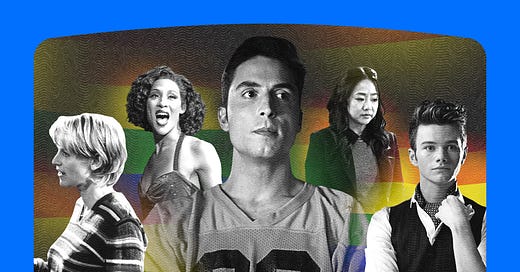Crisis for Queer TV: Disappearing & Out of Vogue
I talk to creators, activists and execs about the future of LGBTQ shows, down 36% YOY in 2024: ‘100% out of fear'

I write about TV development from L.A. I interviewed Kevin Beggs about Lionsgate’s indie playbook, and I wrote about how to get staffed in a writers room now and the mess at Amazon TV. Email me at lesley.goldberg@theankler.com. As a paid subscriber to Series Business, you’ll receive dispatches from Lesley, Elaine Low and Manori Ravindran on the TV business. This is a standalone subscription separate from The Ankler. For access to Series Business and everything The Ankler publishes, including The Wakeup and Richard Rushfield, subscribe here.
To mark June’s Pride Month, my wife and I sat down recently to watch Amazon’s Overcompensating, a semi-autobiographical comedy inspired by comedian Benito Skinner’s coming out process in conservative Idaho. The show, which has been generating strong word-of-mouth buzz for Skinner’s collaboration with Charli XCX, is a raunchy yet grounded college-set exploration of finding yourself that appeals to the queer community and well beyond it. As our rights are under constant attack under the Trump administration — just yesterday, Defense Sec. Pete Hegseth ordered the Navy to remove the name of gay rights pioneer Harvey Milk from one of its ships — it was a refreshing detour to see relatable queer stories on screen.
“We watch these shows to support them and to ensure that we get more of them — but even if we watch, we still may not get more,” I explained to my 80-year-old mother, who was staying with us. Immediately after watching one of the leads get outed, not by their own doing, at the end of the season, my wife — a TV writer herself — proclaimed, “That’s it?! What if we don’t get more?!”
So, what if, despite ranking seventh on Amazon Prime Video’s top 10 in the U.S. on the first Monday of Pride Month after its May 15 debut, Overcompensating joins similarly queer-themed shows — like High School and A League of Their Own (both Amazon) and Peacock’s Laid and Queer as Folk reboot — and ends up as yet another one-and-done? If Peak TV opened the door for so-called “niche” programming that spotlights the LGBTQ community, then what happens to these shows in our current era of contraction?
For many queer showrunners and executives alike, it’s a concerning thought as streamers and studios reduce their scripted output and instead greenlight White Guy With a Gun shows like Amazon’s Reacher and CBS’ Tracker that can reach a broad and global audience. Would a show like Overcompensating be greenlit in today’s contracted industry and against a political backdrop of increasing threats to LGBTQ rights from the Trump administration?
“That’s scary. I don’t know… I would hope so. I hope that the industry does not need to reflect the White House,” Skinner tells me. “We don’t need to pander to the clown parade.”
GLAAD on Monday revealed that there had been 932 anti-LGBTQ incidents — including 10 deaths — in the U.S. between May 1, 2024, and May 1, 2025. That’s 2.5 incidents per day, with more than half of them targeting transgender and gender non-confirming people, a 14 percent year-over-year uptick.
“We’re seeing a growing threat on our community, and it has to do with this rhetoric [from the White House], and the antidote to that rhetoric is storytelling, and the antidote to misinformation is meeting us through these characters,” GLAAD CEO Sarah Kate Ellis tells me. “Having Hollywood pull back on that at this critical inflection point is a recipe for disaster for our community.”
Ellis points to the 36 percent decline in the number of LGBTQ characters on TV as part of GLAAD’s 19th annual report last year. While new data won’t be available until September, GLAAD researchers say the numbers will continue to trend down. “Recent editions of our WWATV (Where We Are on TV) study have shown that inclusive series are ending at a rate that is outpacing the introduction of new inclusive series,” Megan Townsend, GLAAD’s senior director of entertainment research and analysis, tells me by email.
The 20th annual report, which covers the period from June 1, 2024-May 31, 2025, will reflect the cancellations of shows with gay leads including Fox’s 911: Lone Star, Laverne Cox’s Amazon vehicle Clean Slate (from the late and great Norman Lear), Amazon’s The Wheel of Time, Netflix’s Big Mouth and Laid. Additions will include Overcompensating, FX’s Adults and Hulu’s Mid-Century Modern, with a third take on The L Word in development at Paramount after its second update, Generation Q, ran for three seasons on Showtime from 2019-2023.
Despite gains in the Peak TV era, the contraction that began ahead of 2023’s dual strikes and decline of LGBTQ-inclusive programming marks an “enormous missed opportunity” for Hollywood, Ellis says, as 20 percent of Gen Z identify as LGBTQ. “Hollywood is getting caught up in the culture war,” she says, “and I am concerned about representation in Hollywood.”
For today’s Series Business, I spoke to Skinner and other creators, plus several TV and studio insiders — buyers and sellers — about the shifting sands for LGBTQ programming in Hollywood and why losing queer stories isn’t just a blow to the community but also a major missed opportunity for the industry. You’ll learn about:
📺 Why shows like Overcompensating may not get pickups, despite critical buzz and a loyal fanbase
🎤 The scoop from top creators including Liz Feldman and Skinner on what it takes to get a queer show made — and what’s at risk if you try
🌈 Amazon’s support for Skinner’s series and the “very gay team” who worked on it
🧨 How the current political climate is creating “fear” around decision-making in Hollywood and quietly sidelining LGBTQ+ creators
💡 Why GLAAD calls storytelling the most powerful weapon against hate, and how Hollywood is fumbling the opportunity
🛠️ The strategies queer showrunners are deploying to tell their stories — from pitching smarter to bypassing traditional gatekeepers altogether
💔 The painful truth behind canceled shows like A League of Their Own and High School — and the politics behind the budgets
🤳🏽 What Hollywood can learn from TikTok, YouTube and Gen Z as the next wave of queer stories may not start on TV at all








